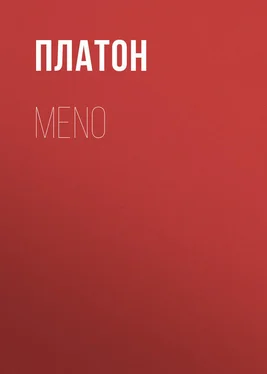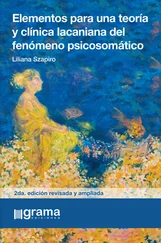Платон - Meno
Здесь есть возможность читать онлайн «Платон - Meno» — ознакомительный отрывок электронной книги совершенно бесплатно, а после прочтения отрывка купить полную версию. В некоторых случаях можно слушать аудио, скачать через торрент в формате fb2 и присутствует краткое содержание. Жанр: Философия, foreign_antique, foreign_prose, на английском языке. Описание произведения, (предисловие) а так же отзывы посетителей доступны на портале библиотеки ЛибКат.
- Название:Meno
- Автор:
- Жанр:
- Год:неизвестен
- ISBN:нет данных
- Рейтинг книги:5 / 5. Голосов: 1
-
Избранное:Добавить в избранное
- Отзывы:
-
Ваша оценка:
- 100
- 1
- 2
- 3
- 4
- 5
Meno: краткое содержание, описание и аннотация
Предлагаем к чтению аннотацию, описание, краткое содержание или предисловие (зависит от того, что написал сам автор книги «Meno»). Если вы не нашли необходимую информацию о книге — напишите в комментариях, мы постараемся отыскать её.
Meno — читать онлайн ознакомительный отрывок
Ниже представлен текст книги, разбитый по страницам. Система сохранения места последней прочитанной страницы, позволяет с удобством читать онлайн бесплатно книгу «Meno», без необходимости каждый раз заново искать на чём Вы остановились. Поставьте закладку, и сможете в любой момент перейти на страницу, на которой закончили чтение.
Интервал:
Закладка:
Plato
Meno
INTRODUCTION
This Dialogue begins abruptly with a question of Meno, who asks, 'whether virtue can be taught.' Socrates replies that he does not as yet know what virtue is, and has never known anyone who did. 'Then he cannot have met Gorgias when he was at Athens.' Yes, Socrates had met him, but he has a bad memory, and has forgotten what Gorgias said. Will Meno tell him his own notion, which is probably not very different from that of Gorgias? 'O yes – nothing easier: there is the virtue of a man, of a woman, of an old man, and of a child; there is a virtue of every age and state of life, all of which may be easily described.'
Socrates reminds Meno that this is only an enumeration of the virtues and not a definition of the notion which is common to them all. In a second attempt Meno defines virtue to be 'the power of command.' But to this, again, exceptions are taken. For there must be a virtue of those who obey, as well as of those who command; and the power of command must be justly or not unjustly exercised. Meno is very ready to admit that justice is virtue: 'Would you say virtue or a virtue, for there are other virtues, such as courage, temperance, and the like; just as round is a figure, and black and white are colours, and yet there are other figures and other colours. Let Meno take the examples of figure and colour, and try to define them.' Meno confesses his inability, and after a process of interrogation, in which Socrates explains to him the nature of a 'simile in multis,' Socrates himself defines figure as 'the accompaniment of colour.' But some one may object that he does not know the meaning of the word 'colour;' and if he is a candid friend, and not a mere disputant, Socrates is willing to furnish him with a simpler and more philosophical definition, into which no disputed word is allowed to intrude: 'Figure is the limit of form.' Meno imperiously insists that he must still have a definition of colour. Some raillery follows; and at length Socrates is induced to reply, 'that colour is the effluence of form, sensible, and in due proportion to the sight.' This definition is exactly suited to the taste of Meno, who welcomes the familiar language of Gorgias and Empedocles. Socrates is of opinion that the more abstract or dialectical definition of figure is far better.
Now that Meno has been made to understand the nature of a general definition, he answers in the spirit of a Greek gentleman, and in the words of a poet, 'that virtue is to delight in things honourable, and to have the power of getting them.' This is a nearer approximation than he has yet made to a complete definition, and, regarded as a piece of proverbial or popular morality, is not far from the truth. But the objection is urged, 'that the honourable is the good,' and as every one equally desires the good, the point of the definition is contained in the words, 'the power of getting them.' 'And they must be got justly or with justice.' The definition will then stand thus: 'Virtue is the power of getting good with justice.' But justice is a part of virtue, and therefore virtue is the getting of good with a part of virtue. The definition repeats the word defined.
Meno complains that the conversation of Socrates has the effect of a torpedo's shock upon him. When he talks with other persons he has plenty to say about virtue; in the presence of Socrates, his thoughts desert him. Socrates replies that he is only the cause of perplexity in others, because he is himself perplexed. He proposes to continue the enquiry. But how, asks Meno, can he enquire either into what he knows or into what he does not know? This is a sophistical puzzle, which, as Socrates remarks, saves a great deal of trouble to him who accepts it. But the puzzle has a real difficulty latent under it, to which Socrates will endeavour to find a reply. The difficulty is the origin of knowledge: —
He has heard from priests and priestesses, and from the poet Pindar, of an immortal soul which is born again and again in successive periods of existence, returning into this world when she has paid the penalty of ancient crime, and, having wandered over all places of the upper and under world, and seen and known all things at one time or other, is by association out of one thing capable of recovering all. For nature is of one kindred; and every soul has a seed or germ which may be developed into all knowledge. The existence of this latent knowledge is further proved by the interrogation of one of Meno's slaves, who, in the skilful hands of Socrates, is made to acknowledge some elementary relations of geometrical figures. The theorem that the square of the diagonal is double the square of the side – that famous discovery of primitive mathematics, in honour of which the legendary Pythagoras is said to have sacrificed a hecatomb – is elicited from him. The first step in the process of teaching has made him conscious of his own ignorance. He has had the 'torpedo's shock' given him, and is the better for the operation. But whence had the uneducated man this knowledge? He had never learnt geometry in this world; nor was it born with him; he must therefore have had it when he was not a man. And as he always either was or was not a man, he must have always had it. (Compare Phaedo.)
After Socrates has given this specimen of the true nature of teaching, the original question of the teachableness of virtue is renewed. Again he professes a desire to know 'what virtue is' first. But he is willing to argue the question, as mathematicians say, under an hypothesis. He will assume that if virtue is knowledge, then virtue can be taught. (This was the stage of the argument at which the Protagoras concluded.)
Socrates has no difficulty in showing that virtue is a good, and that goods, whether of body or mind, must be under the direction of knowledge. Upon the assumption just made, then, virtue is teachable. But where are the teachers? There are none to be found. This is extremely discouraging. Virtue is no sooner discovered to be teachable, than the discovery follows that it is not taught. Virtue, therefore, is and is not teachable.
In this dilemma an appeal is made to Anytus, a respectable and well-to-do citizen of the old school, and a family friend of Meno, who happens to be present. He is asked 'whether Meno shall go to the Sophists and be taught.' The suggestion throws him into a rage. 'To whom, then, shall Meno go?' asks Socrates. To any Athenian gentleman – to the great Athenian statesmen of past times. Socrates replies here, as elsewhere (Laches, Prot.), that Themistocles, Pericles, and other great men, had sons to whom they would surely, if they could have done so, have imparted their own political wisdom; but no one ever heard that these sons of theirs were remarkable for anything except riding and wrestling and similar accomplishments. Anytus is angry at the imputation which is cast on his favourite statesmen, and on a class to which he supposes himself to belong; he breaks off with a significant hint. The mention of another opportunity of talking with him, and the suggestion that Meno may do the Athenian people a service by pacifying him, are evident allusions to the trial of Socrates.
Socrates returns to the consideration of the question 'whether virtue is teachable,' which was denied on the ground that there are no teachers of it: (for the Sophists are bad teachers, and the rest of the world do not profess to teach). But there is another point which we failed to observe, and in which Gorgias has never instructed Meno, nor Prodicus Socrates. This is the nature of right opinion. For virtue may be under the guidance of right opinion as well as of knowledge; and right opinion is for practical purposes as good as knowledge, but is incapable of being taught, and is also liable, like the images of Daedalus, to 'walk off,' because not bound by the tie of the cause. This is the sort of instinct which is possessed by statesmen, who are not wise or knowing persons, but only inspired or divine. The higher virtue, which is identical with knowledge, is an ideal only. If the statesman had this knowledge, and could teach what he knew, he would be like Tiresias in the world below, – 'he alone has wisdom, but the rest flit like shadows.'
Читать дальшеИнтервал:
Закладка:
Похожие книги на «Meno»
Представляем Вашему вниманию похожие книги на «Meno» списком для выбора. Мы отобрали схожую по названию и смыслу литературу в надежде предоставить читателям больше вариантов отыскать новые, интересные, ещё непрочитанные произведения.
Обсуждение, отзывы о книге «Meno» и просто собственные мнения читателей. Оставьте ваши комментарии, напишите, что Вы думаете о произведении, его смысле или главных героях. Укажите что конкретно понравилось, а что нет, и почему Вы так считаете.











